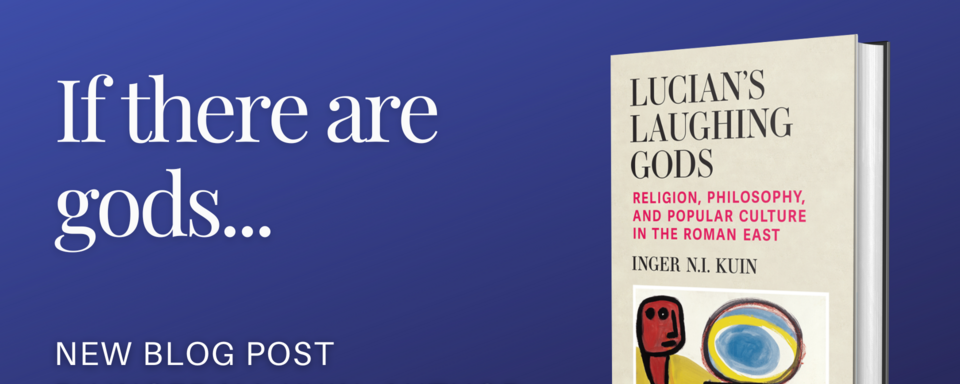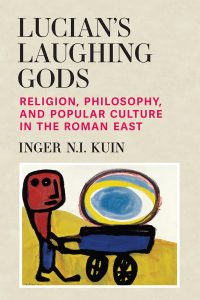If there are gods...

This guest author post is by Inger N. I. Kuin, author of Lucian’s Laughing Gods: Religion, Philosophy, and Popular Culture in the Roman East , from the University of Michigan Press. This book is available in hardcover and ebook .
The gods are assembled on Mount Olympus. After much jostling over who gets to sit where, they have all found a spot. But then there is more shouting. “Get us our portions!” And: “Where is the nectar? We are all out of ambrosia!” The gods are hungry and thirsty, and they are worried about getting their fair share: “Where are the hecatombs? Share the sacrifices!”
This scene comes from a comic prose dialogue, written in ancient Greek for performance in front of a live audience. The author is named Lucian. He lived and worked in the second century CE and was born in a town called Samosata, near the border between modern day Turkey and Syria. At the time this region was part of the Roman Empire. Lucian traveled widely, spending considerable time in both Athens and Rome, and likely ended his career working in the imperial service in Egypt.
In the same dialogue we also encounter Zeus (the piece is titled Tragic Zeus after him) complaining about the “stinginess” of a human named Mnesitheus. When his ship was in distress at sea, he had promised to give the gods sacrificial offerings of “whole hecatombs” if they would allow him to get back to shore safely. But Mnesitheus opportunistically forgot his vow as soon as he reached land. Instead of whole hecatombs – offerings of a hundred oxen each – he gave the gods only one cock, much to Zeus’ dismay.
“He feasted twelve gods by sacrificing just one cock, an old, wheezy one at that, and four very moldy lumps of frankincense. They went out on the coals immediately, and did not give off enough smoke to smell even with the tip of your nose.” In Lucian’s vivid rendering the god’s outrage is palpable, and we can easily picture Zeus sticking out his nose from heaven in vain.
What kind of gods are these, that Lucian can depict them as comically quarrelsome, impatient, and even hungry? This question has plagued scholars for centuries, with many arguing that Lucian’s comedy was either a symptom or a contributing cause of the gods’ demise. A case in point is Karl Marx’s view: “The final phase of a world-historical form is its comedy. The Greek gods… had to die once more, comically, in the dialogues of Lucian.”
Karl Marx in 1875, some three decades after he commented on the gods in Lucian.
Long before he wrote Capital, Marx studied ancient Greek and Latin literature, even writing a dissertation on ancient Greek philosophy. Variations on his assessment that the representation of the gods in Lucian is irreconcilable with respect for them can still be found in modern scholarship, but it runs into several problems.
In the second century CE the gods were far from dead: in all corners of the Empire people prayed to them, celebrated their festivals, consulted oracles at their shrines, restored old temples for them or built new ones, and offered them sacrifices in all shapes and sizes, including the kinds of hecatombs so desired by Lucian’s Zeus.
Now one could argue that Lucian and his audience belonged to a specific subset of people who had abandoned the gods and their worship, or that in general people participated in cult for the gods without actually revering them. But both explanations strain credibility. Lucian pitched his works at a large audience, including people from all walks of life, and the notion that Greco-Roman religion consisted of hollow rituals devoid of beliefs or emotions has been widely discredited.
Instead there is good reason to think that the comic depiction of the gods in Lucian’s works was not considered desacralizing by him and his contemporaries. There were precedents for it in poetry (Homeric epic) and drama (Aristophanes), and there is rich evidence for so-called laughter rites, in which the gods were worshiped with ritualized scurrility. Generally, whenever there is mention of human laughter in relation to the gods in Greco-Roman sources, they are imagined either to reciprocate or to retaliate, but they are never deflated by it.
A late fifth century BCE Attic drinking cup showing Athena as a little owl with a helmet, shield, and spear (Paris Louvre CA2192). This visual pun on depictions of Athena in full armor and with owls is another precedent of comic depictions of the gods. © Marie-Lan Nguyen / Wikimedia Commons
So if Lucian’s comic dialogues did not kill the gods, what did they do?
Throughout Lucian’s works are steeped in philosophy. A dominant current in philosophical thought at the time was to imagine the gods as ethical models for humans. Within this framework the gods are purely good, provident, and benevolent towards humans, that is to say, they are human-lovers, phil-anthropoi. Roman imperial ideology seized on these philosophical ideas, espoused particularly by the Stoic and Platonist schools, to present the emperors themselves as emulating divine virtues, and approximating the gods in this way. Since the gods and the emperors are phil-anthropoi, it was argued, people must necessarily be living in the best of all possible worlds, and any suffering or misfortune is due to individual, human faults.
Thinkers of Lucian’s day, including those working to prop up the virtues of Roman rule, continually strove to reconcile the colorful, anthropomorphic gods of traditional narrative, art, and cult practice with their more abstract and above all good counterparts in philosophy. This was nothing less than a high wire balancing act, and in doing so they opened themselves up to all sorts of vexing questions. For instance, if the gods are perfect and complete, why do they need sacrifices from humans, not to mention foodstuffs?
In his comic dialogues Lucian asks such philosophical questions through the medium of humor. His popular performances engaged with the same problems and themes as philosophers did at the time, which shows that intellectual life did not exclusively rely on literacy. The pursuit of knowledge took place in different realms simultaneously, and there was much continuity between the “high” and “low,” the literate and the oral.
Writing and performing comic dialogues (instead of philosophical treatises) means offering the audience a variety of voices and viewpoints, and Lucian always asks more questions than he answers. With his comically hungry and quarrelsome gods he was responding to the exemplary divinities used by imperial philosophers to defend the status quo. Lucian asks: if there are gods, would not the human experience be better explained by imagining them as laughably incompetent?






